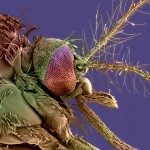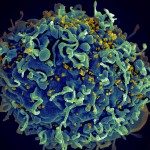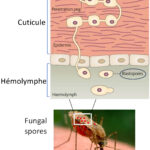Investigate insect immune priming as a translational tool to reduce mosquito vector competence
With 1 million deaths each year, mosquitoes are the deadliest human killer in the world. This is exclusively due to their vectorial capacities of transmitting, through their bites, various microbes that can cause severe diseases. Current vector control strategies are strongly impeded by the development and the increased prevalence of mosquito resistance to insecticide.
My research group aims to characterize the genetic and functional genomic basis of mosquito (Anopheles and Aedes) immunity to distinct microbes. In particular, we aim to understand the molecular basis of the mosquito immune priming response, a memory-like immune response in insects. Insect immune priming is defined as a functional state in which immune cells undergo long-lasting changes that enhance their response to a subsequent infection. In mid-long term, the knowledges and filled gap that will be acquired on the immune priming response could help us developing novel strategies to generate cross-resistances in the mosquito vectors against parasites and/or viruses they transmit, with the aim to reduce mosquito vector competence.
Characterize the functional role of genomic non-coding elements in the mosquito immune response.
The long-ignored non-coding genome is leading to more and more biological importance in the regulation of all the biological processes, including immunity.
We identified a catalog of transcriptional enhancers candidates in Anopheles resistance to the malaria parasite Plasmodium. We want to better understad the function if these transcritional enhancers in mosquito immune response and in particular in the immune priming response.
Study the dynamic circulation of Culex mosquitoes and Culex-borne arbovirosis (West-Nile and Usutu viruses) in the Mediteranean bassin (CUDISEMED).
Arboviruses are responsible for zoonoses that originally operate in a wild cycle involving animals and zoophilic vectors. Human infections occur via direct spillovers from enzootic cycles, and transmission from animals to humans occurs through the bite of anthropo-zoophilic vectors. Traditionally confined to tropical regions, arboviruses such as West Nile virus (WNV) and Usutu (USUV) virus are increasingly being detected in temperate areas, including countries in the Mediterranean Basin. In recent decades, regions in the Mediterranean Basin, such as the Maghreb, the Middle East, and Southern Europe, have been subjected to repeated incursions of WNV and USUV, both transmitted by Culex pipiens and Culex perexiguus mosquitoes. Whether WNV and USUV circulations in these regions result from repeated introductions of novel virus genotypes by migratory birds, and/or from locally established viral reservoirs, is poorly understood. In addition, how global warming, a major public health issue in this region, could influence the transmission of these two arboviruses is understudied. In the current project, we will investigate the circulation dynamics of WNV and USUV by tracking these viruses in their animal hosts and local vectors.






